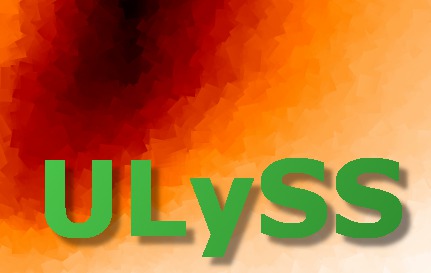function uly_tgm_model_param, version, teff, gravi, fehi
compile_opt idl2, hidden
on_error, 2
if version le 2 then param = dblarr(23,3) $
else if version eq 3 then param = dblarr(26,3) $
else message, 'Version'+string(version)+' of TGM not supported'
for i = 0,2 do begin
teffc = teff*1d0
if (version eq 2 or version eq 3) and i eq 2 then teffc = teff + 0.1
grav = gravi * 1d0
feh = fehi * 1d0
tt = teffc/0.2
tt2 = tt^2-1.
param[0,i] = 1.
param[1,i] = tt
param[2,i] = feh
param[3,i] = grav
param[4,i] = tt^2
param[5,i] = tt*(tt2)
param[6,i] = tt2*tt2
param[7,i] = tt*feh
param[8,i] = tt*grav
param[9,i] = tt2*grav
param[10,i] = tt2*feh
param[11,i] = grav^2
param[12,i] = feh^2
param[13,i] = tt*tt2^2
param[14,i] = tt*grav^2
param[15,i] = grav^3
param[16,i] = feh^3
param[17,i] = tt*feh^2
param[18,i] = grav*feh
param[19,i] = grav^2*feh
param[20,i] = grav*feh^2
if version eq 1 then begin
param[21,i] = exp(tt)
param[22,i] = exp(tt*2)
endif else if version eq 2 then begin
param[21,i] = exp(tt) - 1d - tt*(1d + tt/2d + tt^2/6d + tt^3/24d + tt^4/120d)
param[22,i] = exp(tt*2) - 1d - 2D*tt*(1d + tt + 2d/3d*tt^2 + tt^3/3d + tt^4*2d/15d)
endif else if version eq 3 then begin
param[21,i] = tt*tt2*grav
param[22,i] = tt2*tt2*grav
param[23,i] = tt2*tt*feh
param[24,i] = tt2*grav^2
param[25,i] = tt2*grav^3
endif else message, 'unsupported version of TGM interpolator '+string(version)
endfor
return, param
end
function uly_tgm_eval, eval_data, para
spec_coef = eval_data.spec_coef
spec_npix = (size(spec_coef, /DIM))[0]
teff = alog10(exp(para[0]))-3.7617
grav = para[1]-4.44
param = uly_tgm_model_param(eval_data.version, teff, grav, para[2])
np = (size(param,/DIM))[0] - 1
if (teff le alog10(9000.)-3.7617) then t1 = spec_coef[*,0:np,0] # param[*,0]
if (teff ge alog10(7000.)-3.7617) then t2 = spec_coef[*,0:np,1] # param[*,1]
if (teff le alog10(4550.)-3.7617) then t3 = spec_coef[*,0:np,2] # param[*,2]
if (teff le alog10(7000.)-3.7617) then begin
if (teff gt alog10(4550.)-3.7617) then begin
tgm_model_evalhc = t1
endif else if (teff gt alog10(4000.)-3.7617) then begin
q = (teff-alog10(4000.)+3.7617)/(alog10(4550.)-alog10(4000.))
tgm_model_evalhc = q*t1+(1.-q)*t3
endif else begin
tgm_model_evalhc = t3
endelse
endif else if (teff ge alog10(9000.)-3.7617) then begin
tgm_model_evalhc = t2
endif else begin
q = (teff-alog10(7000.)+3.7617)/(alog10(9000.)-alog10(7000.))
tgm_model_evalhc = q*t2+(1.-q)*t1
endelse
if eval_data.sampling ne eval_data.mod_samp or $
eval_data.start ne eval_data.mod_start or $
eval_data.step ne eval_data.mod_step or $
eval_data.npix ne spec_npix then begin
spec = uly_spect_alloc(DATA=tgm_model_evalhc, START=eval_data.mod_start, $
STEP=eval_data.mod_step, SAMPLING=eval_data.mod_samp)
wrange = eval_data.start + [0d, eval_data.npix * eval_data.step]
if eval_data.sampling eq 1 then wrange = exp(wrange)
c = 299792.458d
velscale = eval_data.step * c
if eval_data.sampling eq 1 then $
spec = uly_spect_logrebin(spec, velscale, WAVERANGE=wrange, /OVER) $
else $
spec = uly_spect_linrebin(spec, eval_data.step, WAVERANGE=wrange, /OVER)
tgm_model_evalhc = *spec.data
uly_spect_free, spec
endif
if eval_data.calibration eq 'C' then begin
n = n_elements(tgm_model_evalhc)
if eval_data.sampling eq 1 then $
wavelength = exp(eval_data.start + dindgen(n) * eval_data.step) $
else $
wavelength = eval_data.start + dindgen(n) * eval_data.step
w = 5550.
c3 = 1.43883d8 / 5550d0 / exp(para[0])
c1 = 3.74185d19 / 5550d0^5
if c3 lt 50. then bbm = (c1 / (exp(c3)-1.)) else bbm = (c1 * exp(-c3))
c3 = 1.43883d8 / wavelength / exp(para[0])
c1 = 3.74185d19 / wavelength^5 / bbm
n1 = where(c3 lt 50, cnt, COMPLEM=n2)
if cnt gt 0 then tgm_model_evalhc[n1] *= (c1[n1] / (exp(c3[n1])-1.))
if cnt lt n then tgm_model_evalhc[n2] *= (c1[n2] * exp(-c3[n2]))
endif
if n_elements(eval_data.lsf) gt 0 and eval_data.lsf ne 'no_lsf' then begin
spec = uly_spect_alloc(DATA=tgm_model_evalhc, START=eval_data.start, $
STEP=eval_data.step, SAMPLING=1)
uly_spect_lsfconvol, eval_data.lsf, spec
tgm_model_evalhc = *spec.data
uly_spect_free, spec
endif
return, tgm_model_evalhc
end

